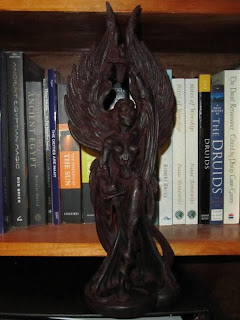Some member of CUUPS see no need for initiation. That’s fine – they are members in identical standing to those who have been initiated in one or more traditions. But some do feel that need. What are these Pagans – or Pagans in any eclectic or unaffiliated group – to do?
One possibility is to join an initiatory tradition. I did that when I joined the Order of Bards, Ovates and Druids… though I joined OBOD for instruction as a Druid and for training as a spiritual leader, not specifically for initiation.
There is value in the lineage of such groups. It provides a tangible and a spiritual link to the past and to a specific heritage. It helps insure that teachings and traditions that have proved to be meaningful and helpful aren’t casually discarded or mindlessly altered. And it provides verifiable credentials, which are important in traditions that include secret or mystical teachings. I have membership in several lineage-based orders (religious, fraternal and professional) and I’m currently studying for another.
But what if there are no initiatory orders in your area, or if the ones that are there are in a tradition that doesn’t interest you, or if you can’t get along with the people who run them? Or, as in the case Friday night, if you need a very specific initiation that doesn’t fall within any major tradition? Without the lineage and heritage of a recognized group, is an initiation valid?
Obviously I think so or I wouldn’t have participated in this one. There are two main sources of authority by which this group or any group of eclectic Pagans can perform initiations.
 |
| Morrigan |
In the end, whether you are working within a lineaged tradition or not, this is the most important authority. Even if you have the full authority of an established tradition behind you, if the gods don’t want someone initiated, they won’t be initiated. Oh, you can do the ceremony, but that doesn’t mean transformation will occur, or even get started. To repeat the words of Tarot artist Robin Wood, “the gods initiate – we only officiate.”
The other authority is the authority of experience. The seven people who led Friday’s initiation have about 150 years of combined experience in Pagan practice. All have been initiated themselves, and all have extensive experience in planning and presenting ritual. One has been a Wiccan High Priestess. Five have been CUUPS leaders, one at two different congregations. Two have hands-on experience with fraternal orders. One trained with a Dianic coven, while another has helped lead a women’s spirituality group for 20 years. And two of us have led workshops, seminars and study groups for the past seven years.
Do you need that much experience to be able to lead an initiation? No. You just need enough. Leading and facilitating initiation is a form of teaching and you can’t teach what you don’t know. You need to have experienced initiation yourself – not just the formal ceremonies, but the transformation they bring. If you haven’t been changed by an initiation, you can’t lead an initiation.
Not all initiations are done in ritual. I’ve been through Ordeals several times. The times in ritual have been instructional – they prepared me for the Ordeals I’ve experienced in the mundane world. And because of that experience, I have some idea of what ritual experiences a candidate is likely to find transformative.
You also need to learn all you can about initiation and read as many initiation rituals as you can. When you do, you start to see patterns and elements common to many initiations. This is how you can figure out what you can borrow from other initiations without violating your oaths. There was an element from my college fraternity initiation I wanted to put into this ritual, but I did not want to break the oath I took to keep that ritual secret. When I found similar elements in a Wiccan initiation and a Masonic initiation, I knew I could use the element if just used different words – I have no oaths with the Wiccans or the Masons.
What about self-initiation? Again, the gods initiate, we only officiate. You can design a transformative experience for yourself such as spending a week alone in the woods or desert. But it is difficult if not impossible to create a strong ritual experience for yourself. This is why initiations are kept secret – much of the value comes from your response to things you don’t know are coming. And even if you don’t believe power can be passed from initiator to initiate (I’m skeptical), there is great power in a group you respect affirming your call and witnessing your response to that call.
What you can do and do well is a self-dedication. You don’t need a full coven to watch you cast a circle, call the Spirits of Nature, invite your ancestors and deities, stand beneath the Full Moon or the Rising Sun and pledge yourself to a god or goddess or to a path of study and practice. That can be the beginning – the initiation – of a new life of learning and service.
Initiation into a lineaged tradition is good, but it is not the only option for those seeking initiation. And remember – every initiation ritual in existence was once performed for the first time.

No comments:
Post a Comment